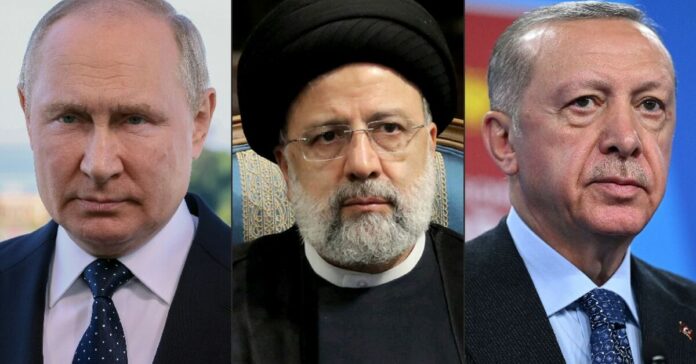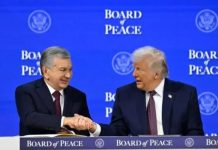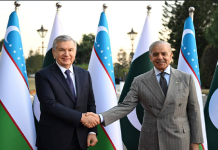Exploring the Significance and Implications of the Astana Summit: A Roadmap for Normalizing Turkish-Syrian Relations
By Muhammad Azhar Kaleem
Astana Summit in Kazakhstan could improve the ties between Turkish-Syrian relations and bring diplomatic breakthrough for ending the Syrian civil war and regional stability, improvisation of relations between Russia, Syria, Iran, Turkey ,hence could bring peace and reconciliation in the Middle East.
A summit of deputy foreign ministers of Russia, Syria, Iran and Turkey, scheduled to be held later this month in Astana, Kazakhstan, has generated great interest and anticipation from international observers. The meeting follows an earlier meeting of foreign ministers in Moscow that marks a major milestone in diplomatic ties between Ankara and Damascus, which have been largely dormant since the start of the Syrian civil war. The aim of the summit is to lay the foundation of a road map for the normalization of relations between Turkey and Syria.
Syria’s civil war, which began more than a decade ago, has caused immense suffering and displacement as the various actors involved in the conflict pursue their own interests. Neighboring Turkey, which has been hit hard by the war, is home to millions of Syrian refugees and faces security problems along its borders. Turkey has long played an active role in the conflict, supporting rebels and conducting military operations against Kurdish forces.
However, recent developments point out a change in Turkey’s approach. The meeting of Russian, Syrian, Iranian and Turkish foreign ministers in Moscow has been seen as historic as it has been the highest-level contact between the Turkish government and Damascus for years. Turkish Foreign Minister Mevrut Cavushor expressed optimism about the prospects for improved relations, while Syrian Foreign Minister Faisal Moqdad stressed the importance of dialogue.
The participation of Russia, a central player in the Syrian conflict, is important to facilitate talks between Turkey and Syria. The Russian government has strongly supported the Syrian government throughout the war, and military intervention in 2015 helped turn the tide in President Bashar al-Assad’s favour. Russia’s active role in bringing these parties together shows its diplomatic strength and willingness to stabilize the region.
Turkey’s motivation for opening talks with Syria comes from a desire to address security concerns along the border, including the presence of Kurdish militias. Moreover, the Turkish government wants to play a more important role in shaping Syria’s future, both politically and economically. Normalizing relations with Damascus can give Turkey an opportunity to influence the country’s development and protect its interests.
For Syria, normalizing relations with Turkey could bring economic benefits, given Turkey’s strong regional presence and potential as a trading partner. Moreover, improved relations could stabilize the border between Syria and Turkey, reduce tensions and pave the way for the return of Syrian refugees accepted in Turkey.
Iran and Russia have been staunch allies of the Syrian government throughout the conflict. Attendance at the summit demonstrates a commitment to solutions aligned with strategic interests. Iran wants to maintain its influence in Syria while Russia wants to strengthen its position as a power broker in the region. Both countries see the stabilization of Syria as essential to their broader regional goals.
The Astana summit will have a profound impact on broader regional dynamics and the conflict in Syria and, if successful, could contribute to a more stable and predictable environment, reduce humanitarian suffering and facilitate post-conflict reconstruction can set the stage.
Rebuilding trust between Turkey and Syria after years of hostility and conflict will be a difficult task. Deep rivalry combined with conflicting interests and geopolitical deliberation presents significant challenges to the possibility of meaningful reconciliation.
The Astana Summit will have many ramifications for the region and the international community as a whole. First, the summit reflects a growing recognition by key players that a diplomatic solution is needed to end the civil war in Syria. Through dialogue, Russia, Syria, Iran and Turkey recognize the limits of military intervention and strive to resolve disputes peacefully. This shift to diplomacy could reduce the violence and suffering of the Syrian people.
Second, the summit provides an opportunity to strengthen regional cooperation. The Astana Summit will foster dialogue, trust-building and the search for the common good by bringing together these four influential nations of hers. This cooperation goes beyond Turkey-Syria relations and could pave the way for wider regional stability. Increased cooperation between Russia, Iran and Turkey will have far-reaching implications across the Middle East and could have a positive impact on other current conflicts and crises.
In addition, the Astana summit has geopolitical implications. Russia’s role as a mediator and facilitator in this process strengthens its position as a major player in the region. Through pioneering diplomatic efforts, Russia has demonstrated its ability to influence and shape the future of the Middle East. This could also affect other world powers, including the United States, which has long been involved in the region.
The upcoming Astana summit marks an important step towards the normalization of relations between Turkey and Syr\ia, and meetings with Russia, Syria, Iran and Turkey’s secretaries of state for foreign affairs will pave the way for further progress. The significance of the summit is not limited to bilateral relations between Turkey and Syria but could have far-reaching implications for the Middle East and the international community as a whole. As the Summit progresses, the world will closely monitor signs of progress and assess the potential for lasting peace and cooperation in the war-torn region.
(Muhammad Azhar Kaleem is a Researcher and Scholar of International Relations and Diplomacy From School of Political Science and International Relations ,Quaid-e-Azam, University ,Islamabad’






